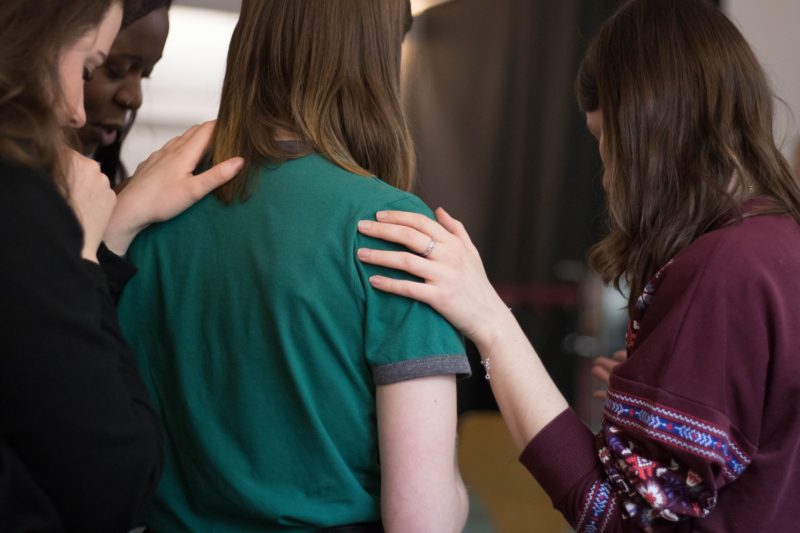PTSD, or post-traumatic stress disorder, is a mental health disorder that can occur following experiencing a traumatic event. Symptoms often include anxiety and depression, avoidance behaviours, flashbacks and nightmares, irritability, distressing thoughts, and feeling emotionally numb. PTSD symptoms usually begin to present shortly after the traumatic event, however, the onset can be delayed. In Canada, it’s estimated that about 8% of Canadians will develop PTSD following exposure to a traumatic event, with the disorder greatly impeding one’s quality of life and functioning. Although the best PTSD treatment is administered by a trained mental health professional, usually with a combination of pharmacotherapy and psychotherapy, there are still many ways that friends and family can ensure the best care for their loved ones who are struggling with PTSD. Having a good social support network, a safe environment, and access to mental health services is crucial in the healing process of anyone dealing with mental health issues, including those with trauma disorders, such as PTSD.
Below is a list of ways to help support someone who is struggling with PTSD

1. Focus on educating yourself about PTSD and other mental illness
Learn as much as you can about what your loved one is experiencing. Understanding how PTSD can affect someone and how the symptoms can manifest allows you to better understand what your loved one is going through and may help you support them more effectively. Although not all those who have PTSD will experience the same symptoms, it’s important to understand that there are degrees of severity of the illness and certain situations may trigger symptoms or worsen them.
2. Offer help with practical barriers
One of the greatest barriers to seeking sufficient care is overcoming practical barriers. PTSD can lead to functional impairments which make completing daily tasks extremely difficult. Your loved one may struggle with booking doctor appointments, driving to appointments, organizing job interviews, or running errands. Something as simple as driving your loved one to the grocery store or helping them find an appropriate doctor and trauma counselor can make a huge difference.
3. Help your loved one who’s struggling with PTSD find appropriate resources
PTSD and other trauma disorders often require a multifaceted treatment approach, therefore ensuring the best PTSD treatment can be complicated. There are many resources available to those with PTSD, but accessing those resources can be overwhelming. You can show your support by helping find a therapist, a support group, appropriate doctors, a PTSD support phone line they can call, or other therapies that may benefit them.

4. Be patient
It may take someone a very long time to open up about their trauma, or they may need to discuss it several times with you. Be patient, listen thoughtfully, and let them do it in their own time. Healing isn’t linear and there may be ups and downs, and setbacks, and that’s all completely normal. Additionally, your loved one may need to discuss their experience with a trained professional before they can share it with you, encourage trauma therapy and give them the time they need.
5. Create a safe environment
Learn about their triggers, as well as the things that make them feel safe and comfortable. Speak to a trained professional yourself about how to create a safe environment, especially if you live together. This includes creating routines and implementing stress reduction techniques into those routines. Perhaps you limit certain noises in the house or increase your home security, maybe you plant a garden, or help your loved one design a room that makes them feel safe and calm.
6. If your loved one is struggling with PTSD, reassure them that they are loved
It’s not uncommon for someone with PTSD to feel like they are a burden, let them know that you are here and you love them. All of us need a reminder such as this, from time to time, and those struggling with mental illness are no different. Remember, your loved one is still the person you care for, even if they are struggling with their mental health.
7. Plan activities together
You may need to take the reins when it comes to activities, so don’t hesitate to plan a dinner date or organize an outside activity such as walking, going for a bike ride, or a hike. When appropriate try and organize nature-based activities or activities with animals, these two approaches have been shown to have therapeutic effects for those with PTSD.

8. Encourage them to seek treatment and support
Seeking treatment can be daunting, especially when there is a stigma attached to mental illness. However, there is absolutely nothing wrong with seeing a therapist, in fact, there are many benefits, whether you are suffering from a trauma-related disorder or not. Most of us would benefit from talking with a trained mental health professional, especially those struggling with PTSD and other mental illnesses. You can offer to go with your loved ones to their appointments, encourage them to seek support, or lead by example by seeing a therapist yourself.
9. Build a support system for those struggling with PTSD
Having a social support system is extremely protective to mental health and research shows that those who have social support have greater rates of recovery from PTSD. Mobilize close friends and family and other loved ones to help out.
10. Don’t forget to care for yourself
It’s important not to lose sight of your own health while supporting others. Care-giver burnout is a state of mental, emotional, and physical exhaustion that occurs when caregivers do not receive adequate support themselves. This is one reason why it’s important to build a social network to help you support your loved one who’s struggling with PTSD or another mental illness, you can’t pour from an empty cup.
PTSD is a complicated trauma disorder that can leave those who are suffering and those caring for them feeling confused and hopeless, but this doesn’t have to be the outcome. There are many excellent therapies and resources available to those struggling with PTSD, including My Recon Therapy. If you are seeking support, PTSD treatment, or simply want more information, please don’t hesitate to get in touch with us. You and your loved ones can heal from PTSD.

Yo, check out djbetcom! It’s the real deal. I’ve been having some lucky streaks there lately. Give djbetcom a shot, you might just score big!